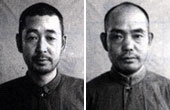Libreville, perfect place for both big and small
By Joseph Catanzaro and Li Fangchao (China Daily Africa) Updated: 2014-07-25 08:44
|
Xu Gongde, entrepreneur and former president of the Overseas Chinese Association of Gabon, stresses the importance of small enterprises. Zhang Wei / China Daily |
Chinese businesses making their mark in Gabon
More than 1,000 Chinese private companies and small businesses in Gabon are together making an economic impact on the country that rivals that of the big state-owned corporations, owners say.
Xu Gongde, entrepreneur and former president of the Overseas Chinese Association of Gabon, says the long-term impact of Chinese private businesses of all sizes in Africa often escapes notice, but should not be underestamated.
"There are a bit more than 1,000 Chinese private businesses here," Xu says. Some people think state-owned companies can't build up an economy, but we (private companies and small and medium-sized enterprises) definitely can, because large companies can't tap into what we are good at. Instead of doing big, one-off projects, we are here to stay."
Xu, 60, one of the first Chinese entrepreneurs to start a business in Gabon, arrived 27 years ago and now considers it his second home. He has a food import business that brings in rice from Asian countries and high-end delicacies from Europe.
"Ninety-five percent of Gabon's food is imported," he says. "I saw an opportunity there."
He also has four timber processing plants.
His businesses alone provide employment to about 700 people in Gabon, more than double the combined local workforce of state- owned behemoths Sinohydro, China Road and Bridge Corporation and China Harbor Engineering Company.
"Private companies provide a lot of employment opportunities for local people here," he says.
Xu says private Chinese businesses and companies in Gabon range from very small restaurants all the way up to large, privately owned ventures in the mining and lumber sectors.
"Most are involved in mining, or timber, or hospitality, or import and export. Our organization has very big and very small members."
In the bustling back streets of the capital, Libreville locals and Chinese workers pack the Weng Chinese Restaurant for dinner.
Manager Li Xiaofeng, 26, has been working at the popular eatery for about three years.
Li, from Jiangxi province, who came to Gabon on the advice of relatives who have a small electrical goods business in Libreville, says conditions are good for small businesses.
"Chinese restaurants are doing really well in Gabon," she says. "I also have Chinese friends here in the timber business, and they say they are doing well, too."
Li says the restaurant, which has been operating in Libreville for about 25 years, was one of the first Chinese eateries in Gabon. These days, more than half the clientele are locals.
"About six of our 16 staff members are from Gabon," she says. "Locals like it because it's generally cheaper to eat at a Chinese restaurant than a French restaurant. And we buy most of our vegetables and meat from our Gabonese friends."
On the 11th floor of one of the few office towers in Libreville, Zhang Longzhu presides over a private business that sits at the opposite end of the spectrum from the Weng Restaurant.
Zhang, 51, deputy director-general for Dameng Mining Industries, oversees a large manganese mine the company operates a five-hour drive from Libreville in Gabon's jungle-cloaked interior.
The mine, a joint venture with a local company, began operating about three years ago and produces about 200,000 tons of manganese a year worth about 1,000 yuan ($160) a ton.
Zhang says Dameng, a private company, has already made a positive impact locally in terms of investment, employment, taxes and infrastructure.
"We invested more than $100 million setting up here, but this does not include some new wharves we are going to build. Mining equipment and exploration were only a small part of our investment. A big portion went on roads and railway lines and port upgrades. It's a big boost to local infrastructure and puts money into the local economy.
"We inject cash into government coffers. We pay corporate taxes to the government here at 30 percent, and we pay them various export, import and miscellaneous taxes, too."
Zhang says the company spends a lot of time and money on training locals.
"We have 270 employees here and 150 are from Gabon."
Chinese private companies are good for both China and Gabon in that they give a lot and take little in return, he says.
"We are very different from the state-owned giants. They get big government loans; we get very little subsidies for exporting raw materials back to China. Sometimes we don't even get that. Most of the money we spend comes from our own pockets."
Ultimately, Zhang says, the biggest distinction between China's private and state-owned companies in Africa is longevity.
"Most Chinese companies here are in construction. The large state-owned companies often come here for one project. Their level of localization can't match ours. We are all about localization, because we will be here for at least 20-30 years."
Xu says many of the very small-scale Chinese businesses in Gabon, like those running import operations, are also doing their bit by providing much needed price relief to local consumers.
"The cost of living in Gabon is very high. There is a small group of people who can afford the higher-end products from France; the rest can't. Cheap and good Chinese products are now becoming very popular because they are affordable to locals."
(China Daily Africa Weekly 07/25/2014 page7)











